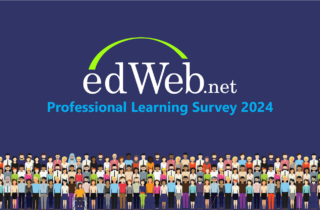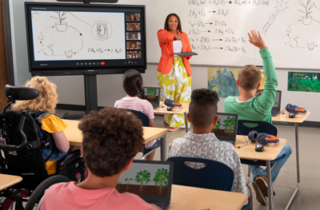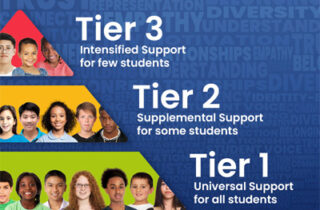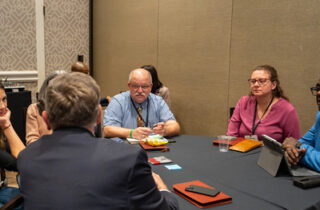High-impact tutoring and Multi-Tiered System of Supports (MTSS) share a common goal: tailoring the academic experience for each and every student, no matter where they are in their journey. In order to make sure that your tutoring is effective long term for your students, district- and state-level experts in the edLeader Panel “Successfully Integrating High-Impact Tutoring Into an MTSS Framework” offered five key areas to address as you develop your program.
edWeb.net has just released results for its annual 2024 Professional Learning Survey with five years of data benchmarking teachers’ and educators’ attitudes and experiences with professional learning.
Artificial intelligence has the potential not only to solve existing problems but also to create new opportunities for both learners and teachers. During the forward-looking edLeader Panel “Harnessing the Power of Applied Artificial Intelligence for Educators,” experts discussed the transformative potential of applied AI in education. Their discussion was both a theoretical exploration and a practical dive into how AI can revolutionize educational practices.
One of the most important duties of teachers is creating inclusive learning environments, which often requires using technology. In the edLeader Panel “Inclusive Learning Environments: Simple Tech Solutions, Big Impact,” experts discussed creating inclusive learning environments and how incorporating technology can have profound impacts on students.
When you consider the power education has in launching a child’s future, giving every student the same interactions, services, and access becomes more than just a regulation; it becomes a guiding principle.
Artificial intelligence (AI) in education began in the 1950s with simple programs focused on playing checkers and natural language processing for medical prescriptions. In the ‘90s, it made a big jump with machine learning. In 2011, the world was introduced to Siri and generative adversarial networks (GANs) appeared in 2014.
Starting the school year with vacant teaching positions rather than a fully staffed and well-prepared faculty has become more common in recent years. A combination of demographic, financial, and cultural trends has created an ongoing problem that many educational leaders now need to address in order to meet the needs of their students.
The cornerstone of a Multi-Tiered System of Supports (MTSS) is equity—meeting each and every student’s needs regardless of the barriers. Since the steps between wanting to make the change in a district and actually implementing MTSS can seem daunting, experts during the edLeader Panel “MTSS Success: “Light Lift” Solutions & Strategies to Improve Behavior & Mental Health,” offered their tips for getting started.
Summer school can produce substantial math and reading gains—that is, if shifts in approaches to summer school instruction and learning occur.
Educators and students working together is the cornerstone of inclusive innovation. During the edLeader Panel “Inclusive Innovation: How School Districts Can Unlock the Power of R&D to Create Transformative Solutions,” superintendents from school districts across the country that are part of Digital Promise’s League of Innovative Schools shared how they are using research and development (R&D) as part of inclusive innovation.











